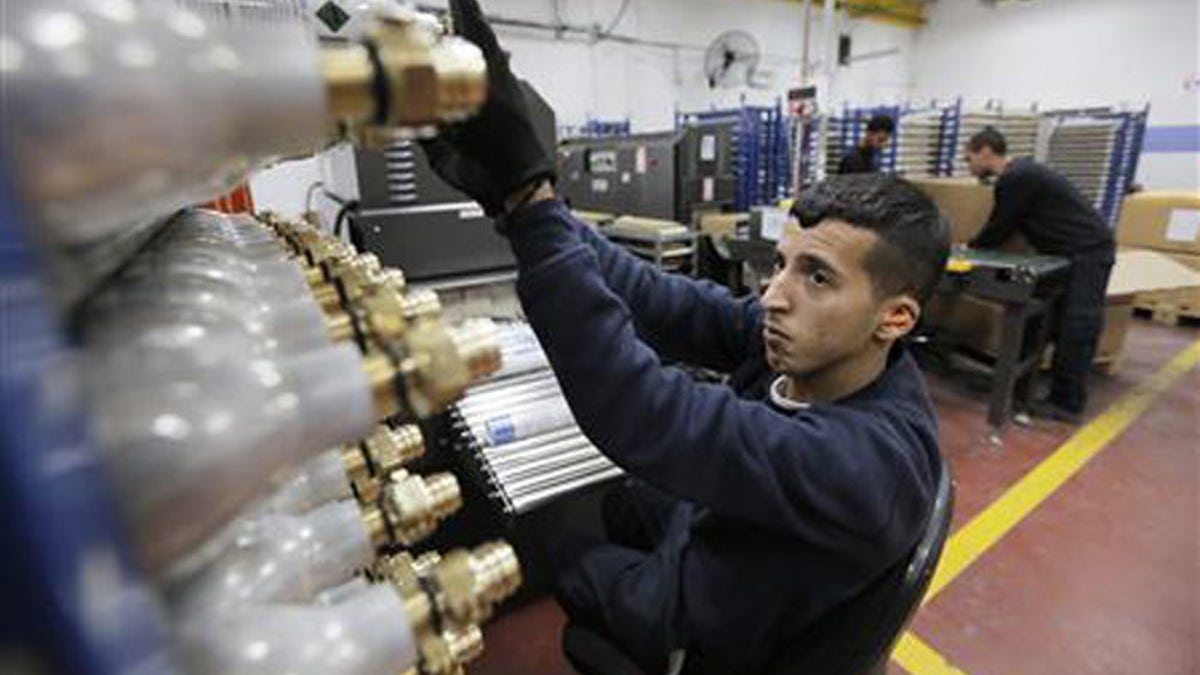
Palestinian employee works at the SodaStream factory in the West Bank Jewish settlement of Maale Adumim Jan. 28, 2014. (Reuters)
HAIFA, Israel – Jews and Palestinians might think an Israeli company providing hundreds of jobs in Palestinian territory is a way to promote peace and prosperity, but some international groups think they know better.
SodaStream, the company whose home-based soda-making machines have become an American sensation, is under pressure to close down a factory in the West Bank, where more than 500 Palestinians work, reportedly earning up to 10 times the area’s prevailing wage. The campaign has reached a fever pitch, after Hollywood star Scarlett Johansson ended her alliance with an international aid group miffed that she would endorse the company. But the boss of SodaStream said he's not going anywhere just because some global critics want him out.
“We will not throw our employees under the bus to promote anyone’s political agenda,” SodaStream CEO Daniel Birnbaum told the Jewish Daily Forward. “[I] just can’t see how it would help the cause of the Palestinians if we fired them.”
Birnbaum said Palestinians and Jews work in complete harmony at his plant, which has a mosque on the premises, allowing workers to meet for prayers during their shifts. Those lucky enough to land jobs with the company are the envy of neighbors who labor for less, or can’t find work at all.
[pullquote]
“I would love to work for SodaStream,” Omar Jibarrat, of Azariah, told the Christian Science Monitor. “They’re quite privileged. People look up to them.”
But as Johansson learned, some international charity and advocacy groups consider the workers unwitting victims of Israeli encroachment onto Palestinian lands. Johansson ended her near decade-long relationship with British international aid organization Oxfam when the charity balked at her endorsement of SodaStream.
“Oxfam believes that businesses, such as SodaStream, that operate in settlements further the ongoing poverty and denial of rights of the Palestinian communities that we work to support,” the charity explained in an official statement. “Oxfam is opposed to all trade from Israeli settlements, which are illegal under international law.”
Faced with the choice, Johansson sided with SodaStream, and not Oxfam, which has a well-publicized relationship with SodaStream rival Coca-Cola. Johansson said SodaStream is doing more than its share to promote peace and create jobs in the West Bank.
"SodaStream is a company that is not only committed to the environment but to building a bridge to peace between Israel and Palestine, supporting neighbors working alongside each other, receiving equal pay, equal benefits and equal rights," Johansson, who in 2007 was named a Global Ambassador for the charity, said in a statement.
The SodaStream factory, situated in one of the largest West Bank settlements of Ma’ale Adumim, has been a persistent target of the Boycott, Divestment, and Sanctions (BDS) movement, established in 2005 with the aim of supporting calls for the West Bank to be returned to Palestinian hands and to delegitimize any Israeli businesses that operate from the territory.
SodaStream, whose commercial for their fizzy drink maker will be screened during the Super Bowl, provides on-site prayer facilities for all its workers and has constructed a synagogue and a small mosque within its premises. But most of all, it provides work in an area where jobs are scarce.
“Before boycotting, they should think of the workers who are going to suffer,” one man told the Monitor. He said he earned the equivalent of $6 a day plucking and cleaning chickens at his last job,but now earns nearly 10 times that at SodaStream, which also provides transportation, breakfast, and lunch.
Many Palestinians say they would welcome the opportunity to work locally for improved wages – whether or not it is for an Israeli company – rather than struggle to make ends meet or be forced to travel miles into Israel through checkpoints at the crack of drawn in order to feed their families.
SodaStream said those outside the region could learn a lot from observing the way employees co-exist at the factory.
“We are able to employ Palestinians side-by-side with Israeli Arabs and Israeli Jews,” Birnbaum told Reuters. “We have about 1,300 people working at this facility in harmony and peace and we’re very proud of being able to be here and to contribute in our way to the co-existence and hopefully to peace in this region.”
The case has also had repercussions a long way from the West Bank factory. On Wednesday, a court in Paris, France, ordered the pro-boycott Association France Palestine Solidarite (AFPS) to pay compensation to SodaStream after suggesting that its products were being sold illegally and were misleading in stating they were “Made in Israel.”
Paul Alster is an Israel-based journalist who can be followed on twitter @ paul_alster and at www.paulalster.com
